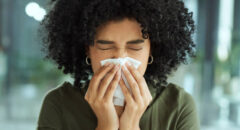
When children have colds, parents may want to hold off on using cough and cold medicine, the U.S. Food and Drug Administration suggests.
Most children get better on their own, and cough or cold medicines won't change the natural course of a cold or make it go away faster.
Also, some cough and cold medicines can have serious side effects, such as slowed breathing, which can be life-threatening, especially in infants and young children, the FDA warns.
The agency doesn't recommend over-the-counter (OTC) medicines for cough and cold symptoms in children younger than 2, and the products' labels advise against giving them to children younger than 4.
RELATED: 5 Foods to Help Fight Back this Cold and Flu Season
How medicine can harm children
These products can harm children if they get more than the recommended dose, take the medicine too often, or take more than one product that contains the same drug. For example, taking both a pain reliever containing acetaminophen and cough and cold medicine containing acetaminophen.
Don't give children medicines that are packaged and made for adults because adult medicines may overdose a child, the FDA says.
The FDA also notes that there are no approved homeopathic cough and cold medicines for children, even though they can be found online and in stores.
RELATED: 5 Natural Remedies for Restless Cough
How to relieve cough and cold symptoms in children naturally
It is important to note that treatment may not always be necessary if your child doesn't have a bothersome cough and isn't feeling uncomfortable or having trouble sleeping. Fevers also help your child's body fight infections. So they should only be
treated if it slows your child down or causes discomfort.
However, if treatment is needed, the FDA has some tips for relieving cough and cold symptoms in infants and children.
Encourage children to drink plenty of liquids to stay hydrated, especially warm drinks to soothe the throat.
A cool-mist humidifier can make breathing easier by decreasing congestion in nasal passages, and saline nose drops or sprays can keep nasal passages moist and help avoid stuffiness.
Your Young Child Is Sick: Is it COVID or RSV?
Nasal suctioning with a bulb syringe or a similar product works very well for children younger than 1-year-old.
Acetaminophen or ibuprofen can be used to reduce fever, aches and pain. Carefully read and follow the instructions or talk to your pharmacist or health care provider about dosage.
Call your doctor if your child has any of the following symptoms:
- A fever of 100.4 degrees Fahrenheit or higher in an infant 2 months or younger.
- A fever of 102 degrees F or higher in children at any age.
- Blue lips.
- Labored breathing, including nostrils widening with each breath; wheezing; fast breathing; the ribs showing with each breath, or shortness of breath.
- Severe headache.
- Not eating or drinking, with signs of dehydration (such as decreased urination).
- Excessive crankiness or sleepiness.
- Persistent ear pain.
- If the child is getting worse.








